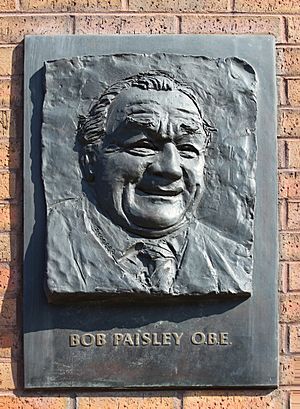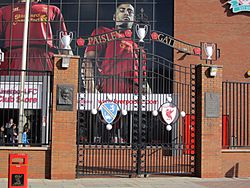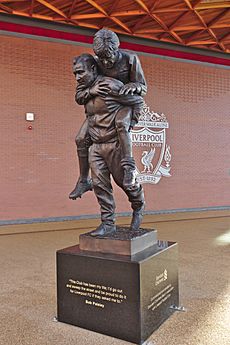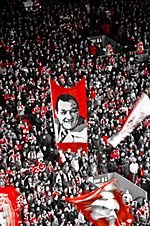Bob Paisley facts for kids

Plaque to Paisley at the Anfield gateway named in his honour
|
|||
| Personal information | |||
|---|---|---|---|
| Full name | Robert Paisley | ||
| Date of birth | 23 January 1919 | ||
| Place of birth | Hetton-le-Hole, County Durham, England | ||
| Date of death | 14 February 1996 (aged 77) | ||
| Place of death | Liverpool, England | ||
| Position(s) | Left-half | ||
| Senior career* | |||
| Years | Team | Apps | (Gls) |
| 1937–1939 | Bishop Auckland | ||
| 1939–1954 | Liverpool | 253 | (10) |
| Managerial career | |||
| 1959–1973 | Liverpool (assistant manager) | ||
| 1974–1983 | Liverpool | ||
| *Club domestic league appearances and goals | |||
Robert "Bob" Paisley was an amazing English football manager and player. He spent almost 50 years with the famous Liverpool club. Many people think he is one of the greatest British football managers ever. He won the European Cup three times, which is a huge achievement. He is also one of only five managers to win the top English league as both a player and a manager for the same club.
Bob Paisley grew up in a small mining village. As a young player, he played for Bishop Auckland. He then joined Liverpool in 1939. The Second World War meant he couldn't play his first game for Liverpool until 1946. In the 1946–47 season, he helped Liverpool win the First Division title. This was their first league win in 24 years! He became the team's captain in 1951. He stopped playing in 1954 but stayed with the club.
After playing, he became a coach and a physiotherapist for Liverpool. At this time, Liverpool was not doing well. But then, Bill Shankly became manager in 1959. Shankly asked Paisley to be his assistant. Together with Joe Fagan and Reuben Bennett, they turned Liverpool into a winning team. In the 1961–62 season, Liverpool got promoted back to the top league. Paisley was a very important part of the team's tactics. They won many trophies over the next twelve years.
In 1974, Bill Shankly retired. Bob Paisley was chosen to take over, even though he wasn't sure at first. He led Liverpool to amazing success both in England and in Europe. In just nine seasons, he won twenty trophies! These included six League Championships, three League Cups, six Charity Shields, three European Cups, one UEFA Cup, and one UEFA Super Cup. He won trophies at a faster rate than almost any other manager. When he retired in 1983, he had won the Manager of the Year Award a record six times. He passed away in 1996 at the age of 77.
Contents
Early Life and First Steps in Football
Bob Paisley was born on January 23, 1919. He grew up in Hetton-le-Hole, a small mining village in County Durham, England. He once said that in his village, "coal was king and football was religion." His father worked in the mines. Life was tough for families back then. Bob had to rely on soup kitchens for food sometimes. When he was seven, during a big strike, he even collected coal dust to help his family make fuel.
Bob was a fantastic footballer from a young age. He played for his school team and helped them win many trophies. He played as a "left half," which is a type of midfielder. After school, he worked as a bricklayer. He joined Hetton Football Club in 1933. His dream was to play for Sunderland, a big club nearby. But they said he was "too small." Instead, he joined Bishop Auckland in 1937.
Joining Liverpool and Wartime Service
Bob Paisley played for Bishop Auckland for two seasons. They were one of the best amateur teams in England. They even won three trophies in one season! In May 1939, just after his 20th birthday, he signed with Liverpool. He was very excited, even though the club was quiet when he arrived. His signing fee was £25, and he earned £8 a week.
Soon after he joined, World War II began. All football competitions were stopped. Bob was called up to join the British Army. He became a gunner in the Royal Artillery. He served in the UK, North Africa, and Italy. He was part of important battles like the Second Battle of El Alamein. Football even helped him during the war. His commanding officer kept him in Britain to play for the regimental team, saving him from a dangerous posting to the Far East.
During his time in Italy, he heard that his younger brother had passed away. In June 1944, Bob was part of the team that helped free Rome. He rode into the city on a tank! Many years later, in 1977, Liverpool won the European Cup in Rome. Bob, as manager, remembered that day. He finally returned to England in 1945. Soon after, he met his future wife, Jessie, a schoolteacher. They got married in 1946 and had two sons and one daughter.
Playing for Liverpool
After the war, football slowly started again. Bob Paisley played his first official game for Liverpool on January 5, 1946. It was an FA Cup match against Chester. Liverpool won 2-0. His first goal for the club came in May 1948 against Wolverhampton Wanderers.
In the 1946–47 season, Bob helped Liverpool win the league title. This was a huge moment for the club. He played in most of their games that season. He was a regular player for several years. In 1950, Liverpool reached the FA Cup semi-final against their rivals Everton. Bob scored a goal, and Liverpool won! But he was then left out of the final game at Wembley. This was very disappointing for him. However, he later said this experience helped him understand how players felt when he had to tell them they wouldn't play in big games. He became the club captain the next season.
Becoming a Coach
Bob Paisley stopped playing football in 1954. But he didn't leave Liverpool. He joined the club's backroom staff. He became a physiotherapist, helping players with their injuries. People said he could often tell what was wrong just by looking at a player. Later, he became the reserve team coach. In 1959, he became the first team trainer.
This was a very important time for Liverpool. Bill Shankly became the new manager in December 1959. Shankly immediately saw how talented Paisley and the other coaches, Reuben Bennett and Joe Fagan, were. He decided to work with them. Shankly changed the training methods. Instead of just running, they focused on speed and using the ball. Five-a-side games became a key part of training. Paisley loved these new ideas.
The coaches created a special room at Anfield called "The Boot Room". It was a place where they met every day to talk about tactics, training, and players. This room became famous. They also changed how players cooled down after training. Paisley, with his knowledge of physiotherapy, explained that players needed to cool down slowly. This new routine helped the team avoid injuries. For example, in the 1965–66 season, Liverpool won the league title and reached a European final using only 14 players all season!
Bob Paisley was known as the "tactician" of the team. While Shankly was the big motivator, Paisley was the one who worked out the clever plans for games. Under Shankly's leadership, with Paisley as his assistant, Liverpool won many trophies. These included three top-league titles, two FA Cups, and one UEFA Cup.
Liverpool's Most Successful Manager

In 1974, Bill Shankly retired. The club directors chose Bob Paisley to take over. They wanted to keep the team's success going. At first, Paisley wasn't sure he wanted the job. But he became incredibly successful. In his nine years as manager, he won at least one major trophy every season, except for his first.
After finishing second in his first season, Liverpool went on to dominate English and European football. They won the league title and the UEFA Cup in 1976. Under Paisley, Liverpool won the league six times and finished second twice. They also won three League Cups, one UEFA Cup, one UEFA Super Cup, and six Charity Shields. Most famously, they won the European Cup three times!
Paisley's team was incredibly strong at home. Between 1978 and 1981, they went 63 league games unbeaten at Anfield. This was a club record for a long time. Other strong teams like Nottingham Forest and Aston Villa tried to challenge Liverpool, but Paisley's team was usually too good.
Bob Paisley won 20 major trophies as Liverpool manager. This makes him the most successful manager in the club's history. He is also the most successful English manager ever. He won trophies at an amazing rate. He was the only manager to win the European Cup three times until Carlo Ancelotti and Zinedine Zidane matched him years later. He also won the Manager of the Year Award six times. The only major trophies he didn't win were the FA Cup (though they were runners-up once) and the European Cup Winners' Cup.

After he passed away in 1996, Liverpool honored him by naming the Paisley Gateway at Anfield. In 2020, a statue of Bob Paisley was put up outside Anfield. It shows him carrying an injured player, Emlyn Hughes, off the field. The statue has a famous quote from Paisley: "This Club has been my life; I'd go out and sweep the street and be proud to do it for Liverpool FC if they asked me to." This shows how much he loved the club.
Retirement and Later Years
Bob Paisley retired as Liverpool manager at the end of the 1982–83 season. He had spent 44 years at the club in different roles. Joe Fagan, his long-time coaching partner, took over from him. Joe Fagan then led Liverpool to win their fourth European Cup.
After retiring, Paisley continued to help the club. He worked as an advisor to Kenny Dalglish when Dalglish became player-manager in 1985. Later, he became a club director.
In his later years, Bob Paisley became unwell. He was diagnosed with Alzheimer's disease. He passed away on February 14, 1996, at the age of 77. He is buried in the churchyard of St Peter's Church in Liverpool. There is also a memorial to him in his hometown of Hetton-le-Hole.
Honours
As a player
Liverpool
- Football League First Division: 1946–47
As a manager
Liverpool Winner
- Football League First Division (6): 1975–76, 1976–77, 1978–79, 1979–80, 1981–82, 1982–83
- League Cup (3): 1980–81, 1981–82, 1982–83
- FA Charity Shield (6): 1974, 1976, 1977, 1979, 1980, 1982
- European Cup (3): 1976–77, 1977–78, 1980–81
- UEFA Cup (1): 1975–76
- UEFA Super Cup (1): 1977
Runner–up
- Football League First Division: 1974–75, 1977–78
- FA Cup: 1976–77
- League Cup: 1977–78
- Intercontinental Cup: 1981
- UEFA Super Cup: 1978
Managerial statistics
| Team | From | To | Record | ||||||||
|---|---|---|---|---|---|---|---|---|---|---|---|
| G | W | D | L | Win % | |||||||
| Liverpool | 26 August 1974 | 1 July 1983 | 535 | 308 | 131 | 96 | 57.57 | ||||
Liverpool FC Manager Stats
English League Titles: 1st (6 titles)
European Cups: 1st (3 European Cups)
League Cups: 1st (3 League Cups)
As an individual
- Officer of the Order of the British Empire (OBE): 1983
- PFA Merit Award: 1983
- FWA Tribute Award: 1984
- English Football Hall of Fame (Manager): 2002
- European Hall of Fame (Manager): 2008
- Football Manager of the Year Award (6): 1975–76, 1976–77, 1978–79, 1979–80, 1981–82, 1982–83
- European Coach of the Year—Sepp Herberger Award: 1981
- European Coach of the Season: 1977–78
- ESPN 4th Greatest Manager of All Time: 2013
- World Soccer 8th Greatest Manager of All Time: 2013
- France Football 26th Greatest Manager of All Time: 2019
See also
 In Spanish: Bob Paisley para niños
In Spanish: Bob Paisley para niños
- List of European Cup and UEFA Champions League winning managers
- List of UEFA Cup and Europa League winning managers
- List of English football championship winning managers
 | John T. Biggers |
 | Thomas Blackshear |
 | Mark Bradford |
 | Beverly Buchanan |


